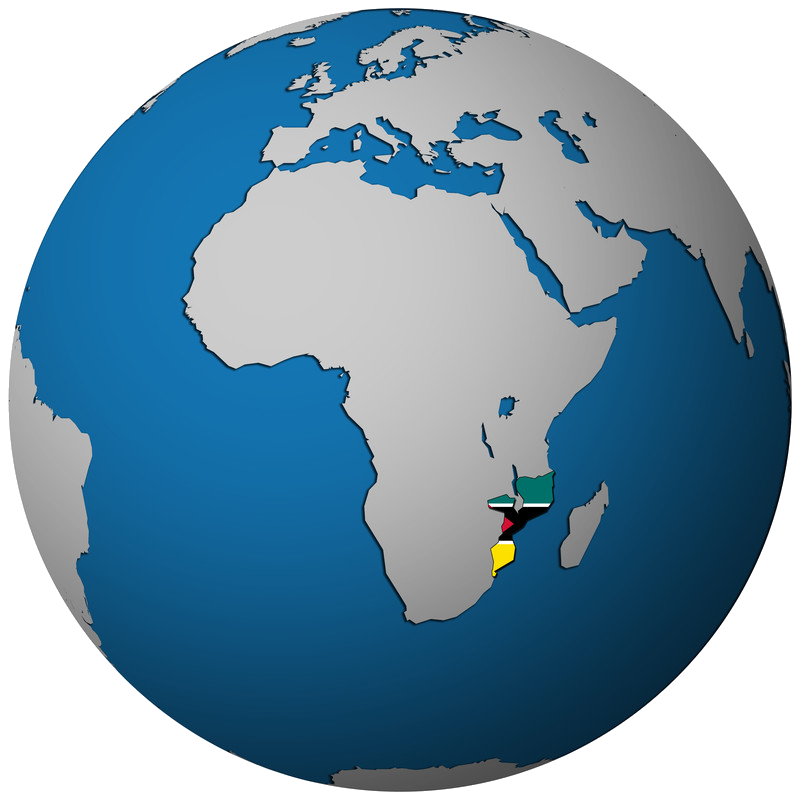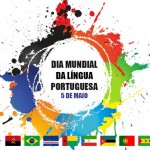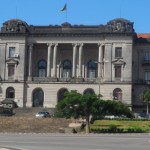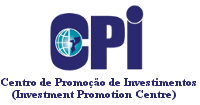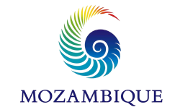Category Archives: current
Isenção de Visto

Conselho de Ministros:
Decreto n.º 10/2023:
Decreto que isenta cidadãos de determinados países de apresentação de visto de entrada, para fins de turismo e de negócio.
Célébration de la Journée Mondiale de la Langue Portuguaise à l’UNESCO – 2022
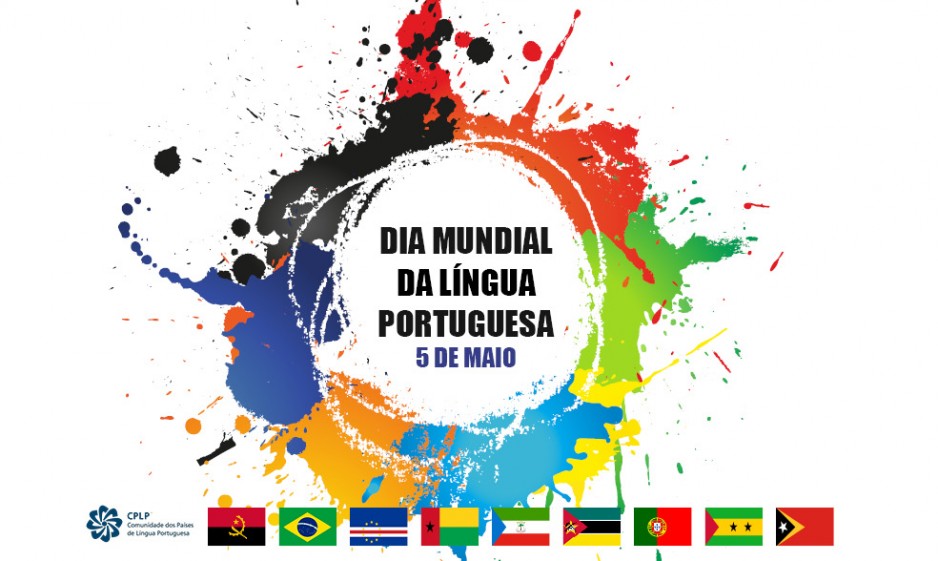
Celebração da Independência de Moçambique
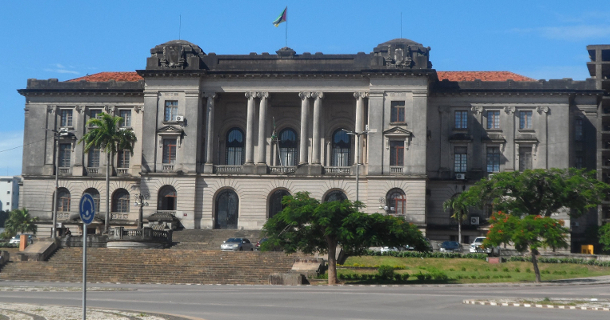
Mensagem de Sua Excelência Alberto Maverengue Augusto, Embaixador de Moçambique na França, por ocasião do 45° Aniversário da independência de Moçambique
Caras e caros moçambicanos,
Estimadas amigas e amigos de Moçambique na França,
Celebramos, no dia 25 de Junho corrente, 45 anos desde que o nosso país conquistou a independência nacional, precisamente a 25 de Junho de 1975.
Como referiu Sua Excelência Filipe Jacinto Nyusi, Presidente da Republica de Moçambique, aquando da mensagem relativa à efeméride, no dia 1 de Junho, “ o dia da independência nacional, constitui uma ocasião distinta, de muita festa e alegria pois é o repositório dos valores mais sublimes da nação que carrega consigo um significado profundo na vida de cada moçambicano e representa o marco da nossa soberania”.
As celebrações deste ano assumem um formato especial e diferente do habitual porquanto acontecem num momento em que o nosso país e o mundo confrontam-se com o desafio do COVID-19. Neste contexto, expresso o meu apreço e satisfação pela forma exemplar como cada compatriota, membro da comunidade moçambicana na França, enfrentou este desafio, permitindo garantir plenas condições de saúde para si e suas famílias.
As celebração deste importante marco da nossa trajectória como nação acontece num momento em que o país depara-se com vários desafios e oportunidades. A consolidação da paz, a preservação da estabilidade em todo o país, o contínuo combate à pobreza e às
desigualdades, a unidade nacional são desafios cuja superação exige o concurso de todos, dentro e fora do país, dentro do marco democrático que caracteriza o quadro institucional do nosso país. As oportunidades que se apresentam com a exploração de hidrocarbonetos, que conta com um importante envolvimento de empresas francesas, abrem uma importante janela para o nosso país alcançar o almejado desenvolvimento inclusivo. Esperamos que cada compatriota na diáspora identifique as oportunidades para dar o seu contributo e maximizar os benefícios que se apresentam à montante e à jusante da exploração de hidrocarbonetos.
Desejo a todos os compatriotas residentes na França e todos os amigos de Moçambique boas celebrações da nossa independência nacional, dentro das limitações impostas pelas autoridades de saúde, e esperamos que nas próximas celebrações possamos juntos conviver e exaltar a nossa moçambicanidade através de diversas manifestações culturais, que caracterizam o nosso diverso e rico mosaico.
CORONAVIRUS (Covid-19) PROTECT YOURSELF & OTHERS.
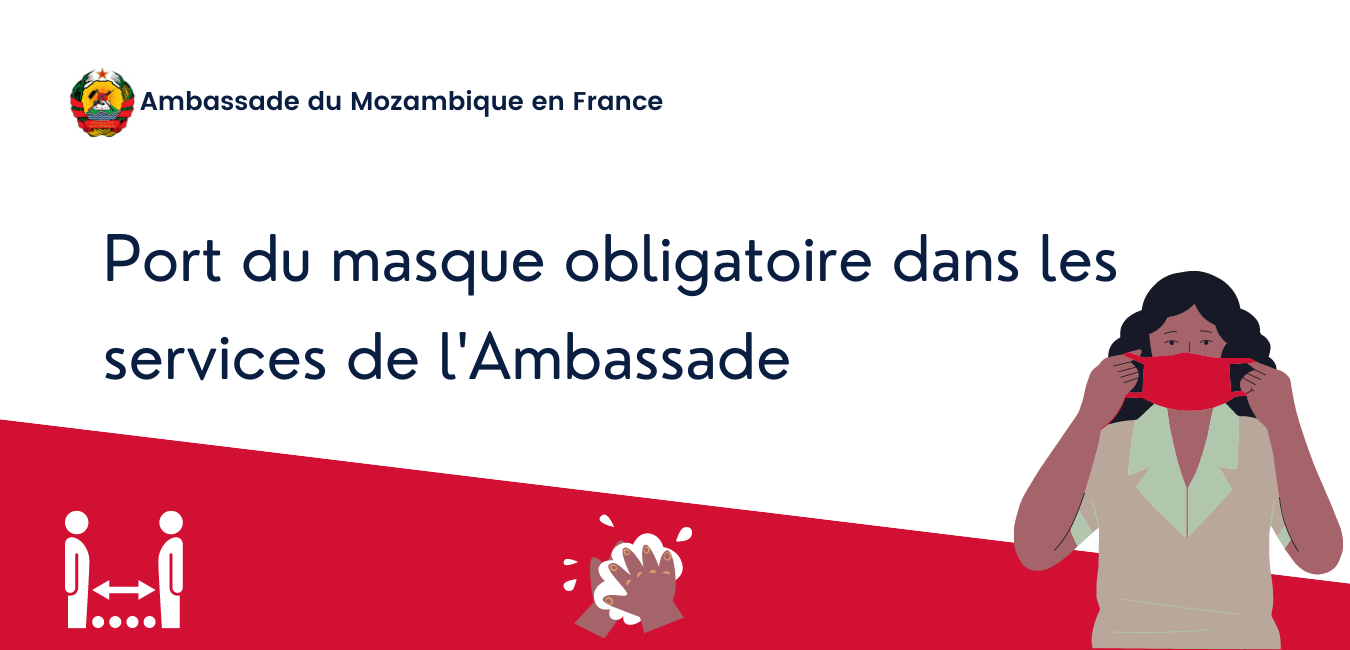
Please note that you will need to wear a mask to access Embassy facilities; therefore, we advise our customers to prioritize the postal service. (send your applications / request by secure mail) during the COVID-19 pandemic period
It should also be noted that quarantine is no longer mandatory in Mozambique for travelers with a negative PCR test.
All administrative requests and applications are made by appointement via Email; info@ambassademozambiquefrance.fr. Inn emergency situations call : 01 47 64 91 32/06 17 90 37 29.
What is a coronavirus (COVID-19)?
Coronaviruses are a large family of viruses which may cause illness in animals or humans. In humans, several coronaviruses are known to cause respiratory infections ranging from the common cold to more severe diseases such as Middle East Respiratory Syndrome (MERS) and Severe Acute Respiratory Syndrome (SARS). The most recently discovered coronavirus causes coronavirus disease COVID-19.
The most common symptoms of COVID-19 are fever, dry cough, and tiredness. Other symptoms that are less common and may affect some patients include aches and pains, nasal congestion, headache, conjunctivitis, sore throat, diarrhea, loss of taste or smell or a rash on skin or discoloration of fingers or toes. These symptoms are usually mild and begin gradually. Some people become infected but only have very mild symptoms.
Most people (about 80%) recover from the disease without needing hospital treatment. Around 1 out of every 5 people who gets COVID-19 becomes seriously ill and develops difficulty breathing. Older people, and those with underlying medical problems like high blood pressure, heart and lung problems, diabetes, or cancer, are at higher risk of developing serious illness. However, anyone can catch COVID-19 and become seriously ill. People of all ages who experience fever and/or cough associated with difficulty breathing/shortness of breath, chest pain/pressure, or loss of speech or movement should seek medical attention immediately. If possible, it is recommended to call the health care provider or facility first, so the patient can be directed to the right clinic.
If you have minor symptoms, such as a slight cough or a mild fever, there is generally no need to seek medical care. Stay at home, self-isolate and monitor your symptoms. Follow national guidance on self-isolation.
However, if you live in an area with malaria or dengue fever it is important that you do not ignore symptoms of fever. Seek medical help. When you attend the health, facility wear a mask if possible, keep at least 1,5m distance from other people and do not touch surfaces with your hands. If it is a child who is sick help the child stick to this advice.
You should seek immediate medical care if you have difficulty breathing or pain/pressure in the chest. If possible, call your health care provider in advance, so he/she can direct you to the right health facility.
How does Coronavirus (COVID-19) Spreads?
People can catch COVID-19 from others who have the virus. The disease spreads primarily from person to person through small droplets from the nose or mouth, which are expelled when a person with COVID-19 coughs, sneezes, or speaks. These droplets are relatively heavy, do not travel far and quickly sink to the ground. People can catch COVID-19 if they breathe in these droplets from a person infected with the virus. This is why it is important to stay at least 1 meter) away from others. These droplets can land on objects and surfaces around the person such as tables, doorknobs and handrails. People can become infected by touching these objects or surfaces, then touching their eyes, nose or mouth. This is why it is important to wash your hands regularly with soap and water or clean with alcohol-based hand rub.
The WHO is assessing ongoing research on the ways that COVID-19 is spread and will continue to share updated findings.
COVID-19 is mainly spread through respiratory droplets expelled by someone who is coughing or has other symptoms such as fever or tiredness. Many people with COVID-19 experience only mild symptoms. This is particularly true in the early stages of the disease. It is possible to catch COVID-19 from someone who has just a mild cough and does not feel ill.
Some reports have indicated that people with no symptoms can transmit the virus. It is not yet known how often it happens. WHO is assessing ongoing research on the topic and will continue to share updated findings?
How can we protect others and ourselves if we don’t know who is infected from COVID-19?
Practicing hand and respiratory hygiene is important at ALL times and is the best way to protect others and yourself.
When possible maintain at least a 1-meter distance between yourself and others. This is especially important if you are standing by someone who is coughing or sneezing. Since some infected persons may not yet be exhibiting symptoms or their symptoms may be mild, maintaining a physical distance with everyone is a good idea if you are in an area where COVID-19 is circulating.
If you have been in close contact with someone with COVID-19, you may be infected.
Close contact means that you live with or have been in settings of less than 1,5m from those who have the disease. In these cases, it is best to stay at home.
However, if you live in an area with malaria or dengue fever it is important that you do not ignore symptoms of fever. Seek medical help. When you attend the health, facility wear a mask if possible, keep at least 1,5m distant from other people and do not touch surfaces with your hands. If it is a child who is sick help the child stick to this advice.
If you do not live in an area with malaria or dengue fever please do the following:
- If you become ill, even with very mild symptoms you must self-isolate
- Even if you don’t think you have been exposed to COVID-19 but develop symptoms, then self-isolate and monitor yourself
- You are more likely to infect others in the early stages of the disease when you just have mild symptoms, therefore early self-isolation is very important.
- If you do not have symptoms, but have been exposed to an infected person, self-quarantine for 14 days.
If you have definitely had COVID-19 (confirmed by a test) self-isolate for 14 days even after symptoms have disappeared as a precautionary measure – it is not yet known exactly how long people remain infectious after they have recovered. Follow national advice on self-isolation.
What can I do protect myself and prevent spreading the virus (COVID19)?
Stay aware of the latest information on the COVID-19 outbreak, available on the WHO website and through your national and local public health authority. Most countries around the world have seen cases of COVID-19 and many are experiencing outbreaks. Authorities in China and some other countries have succeeded in slowing their outbreaks. However, the situation is unpredictable so check regularly for the latest news.
You can reduce your chances of being infected or spreading COVID-19 by taking some simple precautions:
- Regularly and thoroughly clean your hands with an alcohol-based hand rub or wash them with soap and water. Why? Washing your hands with soap and water or using alcohol-based hand rub kills viruses that may be on your hands.
- Maintain at least 1,5m distance between yourself and others. Why? When someone coughs, sneezes, or speaks they spray small liquid droplets from their nose or mouth which may contain virus. If you are too close, you can breathe in the droplets, including the COVID-19 virus if the person has the disease.
- Avoid going to crowded places. Why? Where people come together in crowds, you are more likely to come into close contact with someone that has COVID-19 and it is more difficult to maintain physical distance of 1,5m.
- Avoid touching eyes, nose and mouth. Why? Hands touch many surfaces and can pick up viruses. Once contaminated, hands can transfer the virus to your eyes, nose or mouth. From there, the virus can enter your body and infect you.
- Make sure you, and the people around you, follow good respiratory hygiene. This means covering your mouth and nose with your bent elbow or tissue when you cough or sneeze. Then dispose of the used tissue immediately and wash your hands. Why? Droplets spread virus. By following good respiratory hygiene, you protect the people around you from viruses such as cold, flu and COVID-19.
- Stay home and self-isolate even with minor symptoms such as cough, headache, mild fever, until you recover. Have someone bring you supplies. If you need to leave your house, wear a mask to avoid infecting others. Why? Avoiding contact with others will protect them from possible COVID-19 and other viruses.
- If you have a fever, cough and difficulty breathing, seek medical attention, but call by telephone in advance if possible and follow the directions of your local health authority. Why? National and local authorities will have the most up to date information on the situation in your area. Calling in advance will allow your health care provider to quickly direct you to the right health facility. This will also protect you and help prevent spread of viruses and other infections.
- Keep up to date on the latest information from trusted sources, such as WHO or your local and national health authorities. Why? Local and national authorities are best placed to advise on what people in your area should be doing to protect themselves.
For emergency situation in France please contact: 0800 130 000 and for additional information on COVID-19, visit the following websites:
https://www.gouvernement.fr/info-coronavirus French Government website
https://www.who.int/fr World Health Organization website.
https://www.portaldogoverno.gov.mz/ Mozambicain Gouvernement website.
http://online.tvm.co.mz/site/emdirecto Mozambican Public TV website.


